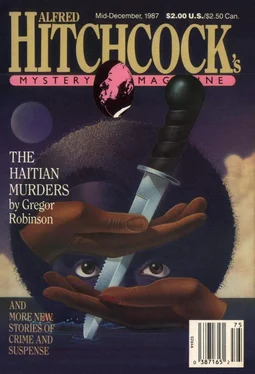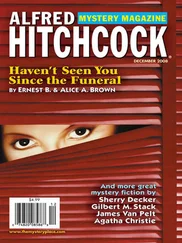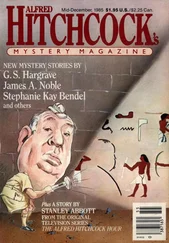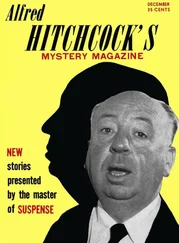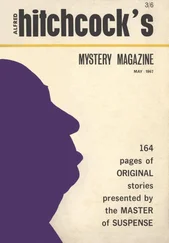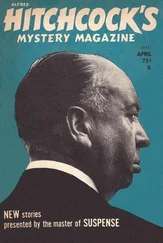Doug Allyn - Alfred Hitchcock’s Mystery Magazine. Vol. 32, No. 13, Mid-December, 1987
Здесь есть возможность читать онлайн «Doug Allyn - Alfred Hitchcock’s Mystery Magazine. Vol. 32, No. 13, Mid-December, 1987» весь текст электронной книги совершенно бесплатно (целиком полную версию без сокращений). В некоторых случаях можно слушать аудио, скачать через торрент в формате fb2 и присутствует краткое содержание. Город: New York, Год выпуска: 1987, ISBN: 1987, Издательство: Davis Publications, Жанр: Детектив, Триллер, на английском языке. Описание произведения, (предисловие) а так же отзывы посетителей доступны на портале библиотеки ЛибКат.
- Название:Alfred Hitchcock’s Mystery Magazine. Vol. 32, No. 13, Mid-December, 1987
- Автор:
- Издательство:Davis Publications
- Жанр:
- Год:1987
- Город:New York
- ISBN:ISSN: 0002-5224
- Рейтинг книги:5 / 5. Голосов: 1
-
Избранное:Добавить в избранное
- Отзывы:
-
Ваша оценка:
- 100
- 1
- 2
- 3
- 4
- 5
Alfred Hitchcock’s Mystery Magazine. Vol. 32, No. 13, Mid-December, 1987: краткое содержание, описание и аннотация
Предлагаем к чтению аннотацию, описание, краткое содержание или предисловие (зависит от того, что написал сам автор книги «Alfred Hitchcock’s Mystery Magazine. Vol. 32, No. 13, Mid-December, 1987»). Если вы не нашли необходимую информацию о книге — напишите в комментариях, мы постараемся отыскать её.
Alfred Hitchcock’s Mystery Magazine. Vol. 32, No. 13, Mid-December, 1987 — читать онлайн бесплатно полную книгу (весь текст) целиком
Ниже представлен текст книги, разбитый по страницам. Система сохранения места последней прочитанной страницы, позволяет с удобством читать онлайн бесплатно книгу «Alfred Hitchcock’s Mystery Magazine. Vol. 32, No. 13, Mid-December, 1987», без необходимости каждый раз заново искать на чём Вы остановились. Поставьте закладку, и сможете в любой момент перейти на страницу, на которой закончили чтение.
Интервал:
Закладка:
Tommas merely shrugged his shoulders.
“Dishonored by the death of her fiancé?” I said.
But he would say no more.
On the plane to Miami I thought about Tommas’s remark. Dishonored: it was a word from an old novel. And from time to time throughout the day, I thought about the look on Madame Dell’s face when I had asked her about Pierre, and about Winnie, telling me the village gossip that Pierre’s murder had something to do with women. She never said it was the tourists.
I flew back to Marsh Harbour late in the afternoon and took a water taxi across the channel to the village. In the evening I walked along the path past Burnett’s place, through the scruffy silvery woods to Tommas’s hut. The barking of a large German shepherd brought him outside. He calmed the dog. I stood there until finally — and without grace — he invited me into the hut.
“It’s about the translations you did for the police who came over from Nassau,” I said. He shrugged his shoulders, then led me to the wooden table in the corner of the room.
The details were there, in those letters tied with a ribbon which we had seen in Madame Dell’s bureau. I laboriously went over Tommas’s translations. The money had been provided to Madame Dell by the family of her husband — the girl’s father — and was to be paid in six installments, the final payment on the day of the marriage. Of course the efficient men from New Providence would not have known about the rumors in the woods — about the understanding between Pierre and Madame Dell’s daughter. They should not have been so brusque with Constable MacMahon.
“Did she love him?” I said.
“I would say so,” said Tommas. “She slept with him.” He would elaborate no further.
“A dowry?” said Burnett. We were at the Poolside Bar of the Majestic. The waiter brought our drinks — gin and soda for him, beer for me.
“Which Pierre had almost certainly already spent,” I said.
“And the girl killed her mother?”
“Not her mother. Her stepmother. Her wicked stepmother, the person who had killed her lover. Perhaps she found the knife. Who knows?”
“Imagine Madame Dell murdering the fellow for that amount of money in the first place.”
“It may seem small to us, but it was a lot of money to them. Still, I don’t think it was the money,” I said. “It was bad enough that he was seeing other women. But breaking the engagement: he had dishonored the woman, dishonored the family. He broke his promise. He was an adventurer. Breach of contract — like an old novel, but with no recourse to a court of law. So Madame Dell followed him into the mangroves where he used to meet her stepdaughter and killed him in the darkness.”
“Honor and love. A romantic tale,” said Burnett. “How do you know all this?”
“I don’t know for certain. But it’s in the figures.”
I had returned to the bank immediately after visiting Tommas. I took Madame Dell’s and Pierre’s accounts from the files and quickly compared them. The large withdrawals from Madame Dell’s account were followed in all cases a day or two later by deposits in his. Four of Pierre’s deposits were identical to her withdrawals and the fifth was only slightly less.
“Why don’t you go the police?” Burnett asked.
“For the same reason I don’t go to the U.S. tax department about you.”
“How’s that?” Burnett bridled a little, so I quoted the law.
“ ‘No person under Bahamian jurisdiction is permitted to divulge bank information obtained in the course of his or her employment.’ It protects us all,” I said, “even the Haitians.”
Burnett said nothing.
A few days later Madame Dell’s daughter came to see me at my office. She was tall and handsome and even more laconic than I had remembered. I had noticed that some of the other Haitians in the village had started to avoid her. She withdrew all her own money — she would have to wait for the lawyers to get the inheritance — and then she left the bank, and the island too — for Miami, we heard. We never saw her again.
It was a matter of professional curiosity. Before closing the file, I went over the record of transactions in her account. I realized then that what I had told Burnett was wrong, that Tommas, too, had been mistaken. There in the figures were five large deposits. I knew without checking that the amounts were the same, that they had come from Pierre. Madame Dell must have discovered what they were up to — an elaborate scheme to get what I suppose Madame Dell’s daughter no doubt saw as rightfully hers. It was not a question of honor and love. I should have guessed, for I was no poet: it was the money after all.
Fallen Leaves
by Stephen Wasylyk

Side by side, the three graves were partially covered by the golds, reds, and browns of the withered leaves that had drifted down from the tall trees, now glowing amber in the setting sun like paintings in a gallery lighted to bring out their best.
Turnpike travel is a great time-saver, except when a major crash brings you to a halt with nowhere to go and nothing to do except wait, wiping out any anticipated time of arrival you may have had and leaving you thankful only that you hadn’t been involved in the accident.
Now that I was here, I knelt and brushed the fallen leaves away from the bronze ground-level grave markers. It seemed the least I could do.
I rose to catch the faint, acrid odor of leaves being burned illegally. There had been a time when we all grew up with that odor as the dependable harbinger of winter, but winter is only a step in nature’s inexorable cycle and spring always comes again.
Only in a man’s mind can winter remain beyond its allotted time. He carries its coldness with him, and at odd times in odd places memories trigger its chill and he wonders if he will ever be warm again.
Sam King and I liked to ride our bikes to the hill outside of town where we could sit on a stone wall, the valley spread before us and the houses like white chips clustered in a green bowl that was fractured by the ribbon of the river, and we would talk of all the things that fourteen-year-olds talk about, like girls, sports, girls, school, girls, parents, and girls, with an occasional discussion about women.
The wall was more than just a place to sit. Accidentally moving a loose stone one day, we had found a cavity inside that became the secret repository of our possessions, particularly those we didn’t want our parents to see.
The daily Greyhound came by, the driver waving. He’d once told us he’d instructed a new driver not to worry about not spotting the turn. Turn left when you see the two kids, he’d said...
The roar of the bus had scarcely faded when we saw the figure marching up the road; head up, shoulders back, his stride smooth.
He slipped the pack from his shoulders and dropped it on the grassy shoulder before us; young, perhaps in his mid-twenties, his dark hair long, his face burned brown, a hard fitness showing through the sweat-stained shirt.
“Hi. Know where I might get a drink of water around here?” He ruefully nudged a canteen strapped to the pack. “Sort of miscalculated somewhere along the line.”
I handed him the thermos I carried in the basket of my bike.
“We run into the same problem pedaling up the hill.”
He sipped and indicated the town. “You two from down there?”
“Yeah,” said Sam. “Where are you going?”
“Just walking, but about ready to quit for the day. Know a place where I can put up for the night? Cheap?”
I slid off the wall. “Sure. We’ll take you down.”
Читать дальшеИнтервал:
Закладка:
Похожие книги на «Alfred Hitchcock’s Mystery Magazine. Vol. 32, No. 13, Mid-December, 1987»
Представляем Вашему вниманию похожие книги на «Alfred Hitchcock’s Mystery Magazine. Vol. 32, No. 13, Mid-December, 1987» списком для выбора. Мы отобрали схожую по названию и смыслу литературу в надежде предоставить читателям больше вариантов отыскать новые, интересные, ещё непрочитанные произведения.
Обсуждение, отзывы о книге «Alfred Hitchcock’s Mystery Magazine. Vol. 32, No. 13, Mid-December, 1987» и просто собственные мнения читателей. Оставьте ваши комментарии, напишите, что Вы думаете о произведении, его смысле или главных героях. Укажите что конкретно понравилось, а что нет, и почему Вы так считаете.
